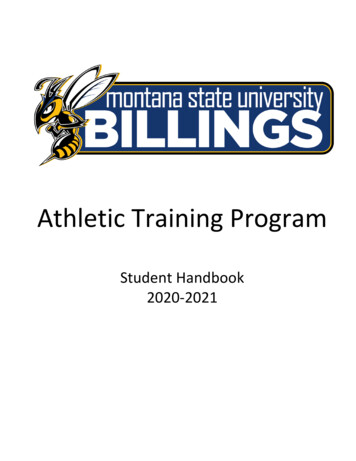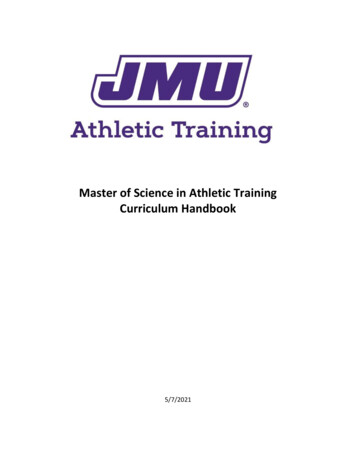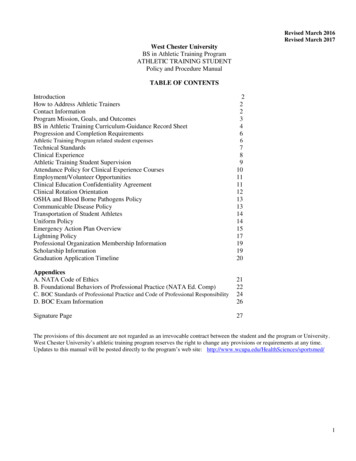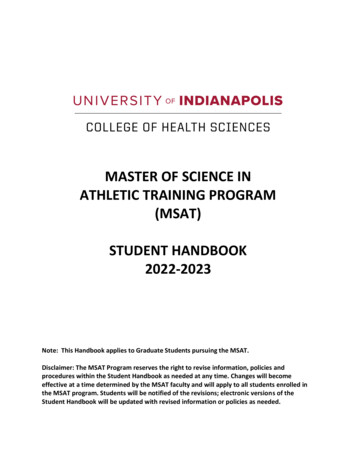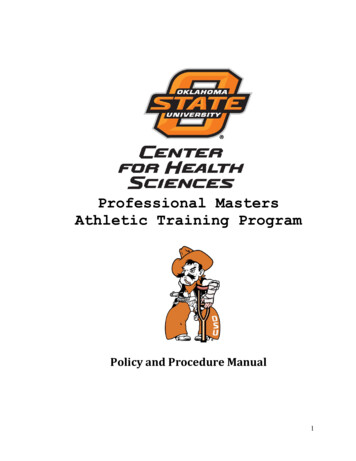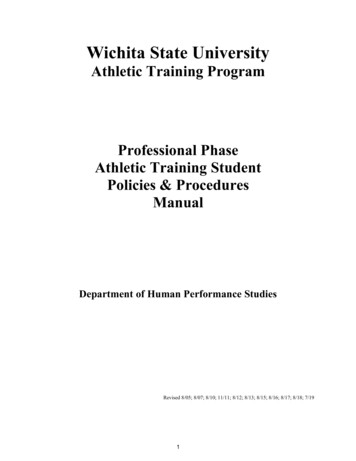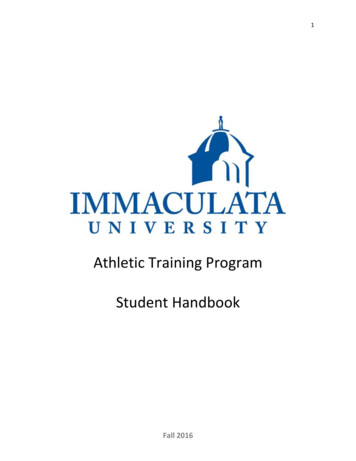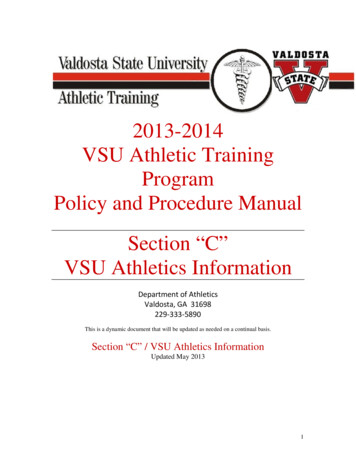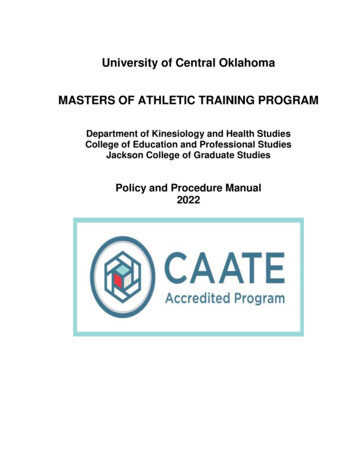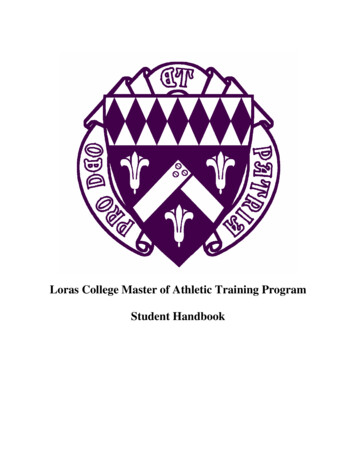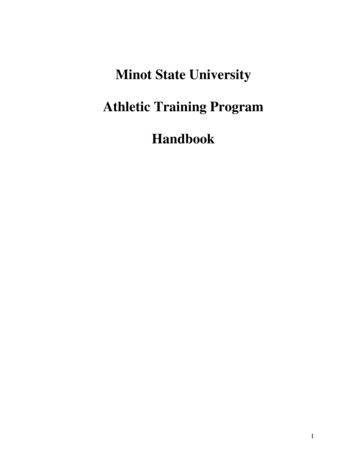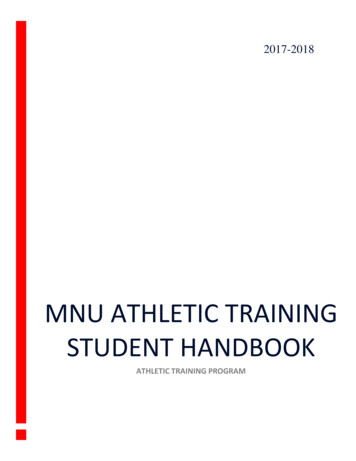
Transcription
2017-2018MNU ATHLETIC TRAININGSTUDENT HANDBOOKATHLETIC TRAINING PROGRAM
MidAmerica Nazarene UniversityAthletic Training ProgramStudent Handbook2017-2018The information in this handbook is intended to educate, guide, and protect the Athletic TrainingStudent while enrolled in the MidAmerica Nazarene University Athletic Training Program.MidAmerica Nazarene University is accredited by theCommission on Accreditation of Athletic Training Education (CAATE).Revised July 20171
MidAmerica Nazarene UniversityAthletic Training ProgramStudent Handbook2017-2018Table of ContentsProgram Faculty and AdministrationIntroductionPurposeMission StatementProgram Goals and Learning ObjectivesCAATE Accreditation StatusFoundational Behaviors of Professional PracticeAthletic Training Program Admissions RequirementsTransfer Student PolicyTechnical Standards for AdmissionScholarships and AwardsAthletic Training Program Course RequirementsAthletic Training Program Curriculum SequenceAcademic and Clinical Retention PolicyProgram Requirements for GraduationAthletic Training Program Disciplinary PolicyNotice of Formal Disciplinary Action ProcedureProbationSuspensionDismissalGrievances and AppealsClinical Education PolicyStudent Assessment and Application of Competencies and CIPsClinical Experience OverviewClinical Activity BreakdownClinical Education Experience ExpectationsCriteria for Progression through the Clinical Education CoursesAdditional Clinical Education ExperiencesExpectations and Responsibilities of MNU Athletic Training StudentsExpectations and Responsibilities of MNU PreceptorsClinical Education Hours Policy and RequirementsDocumentation of Clinical HoursEnforcement of Clinical HoursViolations of the Clinical Hours PolicyProfessional Development PointsCommunication and Problem 22232527272829303234343536362
MidAmerica Nazarene UniversityAthletic Training ProgramStudent Handbook2017-2018Code of ConductDress CodeClinical Supervision and Travel PolicyTherapeutic Modality PolicyProfessional Confidentiality and Social Media PolicyHIPAA and FERPA Training VerificationCommunicable Disease PolicyImmunization RecordsBlood-Borne Pathogen Policy and Universal PrecautionsAppendix AAppendix BAppendix C3738394041414243444850543
MidAmerica Nazarene UniversityAthletic Training ProgramStudent Handbook2017-2018MNU Athletic Training Program Faculty and AdministrationChris Crawford, MSE, LAT, ATC Academic and Professional Title Director, Athletic Training Program Assistant Professor, Health and Exercise Science DepartmentContact Information Office: 913-971-3694 Email: cpcrawford@mnu.eduWilliam Heffernan, MS, LAT, ATC Academic and Professional Title Clinical Education Supervisor Assistant Athletic TrainerContact Information Office: 913-971-3263 Email: wheffernan@mnu.eduKaren Wiegman, PhD, RN Academic and Professional Title Dean, School of Nursing and Health Sciences ProfessorContact Information Office: 913-971-3839 Email: kdwiegman@mnu.edu4
MidAmerica Nazarene UniversityAthletic Training ProgramStudent Handbook2017-2018MidAmerica Nazarene UniversityAthletic Training ProgramIntroductionWelcome to the MNU Athletic Training Program. The Program Director, Clinical Education Coordinatorand other Athletic Training Program faculty and staff want to sincerely thank you for agreeing to be apart of our program. The MNU Athletic Training Program, strives to provide you, the students with acomprehensive classroom and clinical education to prepare you for many of the possibilities ofemployment following graduation and passing the BOC Examination.PurposeThe purpose of this handbook is for the Athletic Training Students working towards acceptance into andcompletion of the Athletic Training Program at MidAmerica Nazarene University. This handbookcontains policies, procedures, guidelines, and specific to the MNU Athletic Training Program andrelevant professional information to direct and inform the Athletic Training Student’s learning. Studentsparticipating in a clinical experience(s) at an affiliated clinical site, should adhere to the policies andprocedures of those institutions/sites as stated by the supervising Preceptor only when those policiesand procedures do not conflict with the educational philosophy of the Athletic Training Program oraccreditation standards established by the Commission on Accreditation of Athletic Training Education(CAATE).All students accepted into the MNU Athletic Training Program, and those working to be accepted, areresponsible to learn and understand all information contained in this handbook. Deviation from thestated policies and procedures could constitute placing the Athletic Training Student on probation in themajor, suspension from clinical field experiences, revocation of clinical field experience hours, ordismissal from the MNU Athletic Training Program. If any student does not understand of the materialprovided, the student should consult with the Program Director.Athletic Training Program Mission StatementThe MNU Athletic Training Program’s purpose is to engage all students in providing the highest level ofeducational instruction in a Christian environment while developing Christ-centered learners. Ourprogram is devoted to producing morally, academically, spiritually, and professionally qualifiedindividuals for a career in Athletic Training, an Allied Health Profession recognized by the AmericanMedical Association (AMA).5
MidAmerica Nazarene UniversityAthletic Training ProgramStudent Handbook2017-2018Athletic Training Program Goals and Learning Objectives1. To provide an academic program that enables students to demonstrate competence in athletictraining knowledge, skills, application of the NATA Athletic Training Educational Competencies(5th ed.), and NATA Role Delineation Study.2. To develop practitioners who focus on advancing and critically examining the body of knowledgefor evidence-based practice, as a foundation for the delivery of patient-centered care.3. To provide knowledge based prevention methods and health promotion activities that alliedhealth professionals practice and use to promote healthy lifestyle choices.4. To develop practitioners that have informed diagnostic knowledge and clinical application skillsfor injury assessment, management, treatment, and rehabilitation.5. To develop practitioners who are competent and confident in the delivery and management ofthe acute care of injury and illnesses.6. To develop practitioners who possess the ability to observe and recognize mental and emotionalhealth issues within the student athlete population and demonstrate the proper procedures forreferral.7. To develop practitioners who possess the ability to properly manage an athletic trainingdepartment, while understanding the role of an athletic trainer as a healthcare provider in thelarger context of the healthcare system.8. To foster professional development and social responsibility by encouraging studentparticipation in professional organizations, in addition to activities that benefit the largercommunity and/or profession without regard to personal gain.9. To uphold the Christian mission of MidAmerica Nazarene University, while providing anaccredited curriculum that is challenging, innovative and of the highest quality.CAATE Accreditation StatusThe MNU Athletic Training Program is nationally accredited through the Commission on Accreditation ofAthletic Training Education Programs (CAATE). After initial accreditation in 2004, the MNU AthleticTraining Program will celebrate 10 years of program accreditation and will not stop growing. It is thedream of this program to be a destination program for all interested in athletic training.All students who successfully complete the MNU Athletic Training Program requirements are eligible asa candidate to challenge the National Athletic Trainers’ Association – Board of Certification examination(BOC).6
MidAmerica Nazarene UniversityAthletic Training ProgramStudent Handbook2017-2018Foundational Behaviors of Professional PracticeThese basic behaviors permeate professional practice and should be incorporated into instruction andassessed throughout the educational program.Privacy of the Patient Recognize sources of conflict of interest that can impact the client’s/patient’s health.Know and apply the commonly accepted standards for patient confidentiality.Provide the best healthcare available for the client/patient.Advocate for the needs of the client/patient.Team Approach to Practice Recognize the unique skills and abilities of other healthcare professionals.Understand the scope of practice of other healthcare professionals.Execute duties within the identified scope of practice for athletic trainers.Include the patient (and family, where appropriate) in the decision-making process.Work with others in affecting positive patient outcomes.Legal Practice Practice athletic training in a legally competent manner.Identify and conform to the laws that govern athletic training.Understand the consequences of violating the laws that govern athletic training.Ethical Practice Comply with the NATA’s Code of Ethics and the BOC’s Standards of Professional Practice.Understand the consequences of violating the NATA’s Code of Ethics and BOC’s Standards ofProfessional Practice.Comply with other codes of ethics, as applicable.Advancing Knowledge Critically examine the body of knowledge in athletic training and related fields.Use evidence-based practice as a foundation for the delivery of care.Appreciate the connection between continuing education and the improvement of athletictraining practice.Promote the value of research and scholarship in athletic training.Disseminate new knowledge in athletic training to fellow athletic trainers, clients/patients, otherhealthcare professionals, and others as necessary.Cultural Competence Demonstrate awareness of the impact that clients’/patients’ cultural differences have on theirattitudes and behaviors toward healthcare.Demonstrate knowledge, attitudes, behaviors, and skills necessary to achieve optimal healthoutcomes for diverse patient populations.Work respectfully and effectively with diverse populations and in a diverse work environment.7
MidAmerica Nazarene UniversityAthletic Training ProgramStudent Handbook2017-2018Professionalism Advocate for the profession.Demonstrate honesty and integrity.Exhibit compassion and empathy.Demonstrate effective interpersonal communication skills.Because the entry-level credential (ATC ) signifies that the holder is a practitioner prepared for entryinto the practice of athletic training, these Behaviors are infused into every aspect of the ATEP in orderto prepare students for this public trust. While some Behaviors can be easily defined and presented,students may see applications repeatedly but be unable to demonstrate or modify their behaviorbecause of the roles they are allowed to assume. Other Behaviors are demonstrated by classroom andclinical educators to expose students to the desired behavior, and yet these Behaviors may not bepracticed by students (professionals-in-training) because of the nature of their roles and responsibilities.It is most likely the true measure of a student’s understanding of these Behaviors will occur in theclinical setting with patients to whom he or she has a duty. Many of these Foundational Behaviors ofProfessional Practice will be achieved to their fullest extent when a student becomes a certified athletictrainer and has been practicing for some time (NATA, 2006).National Athletic Trainers’ Association, Athletic Training Education Competencies (5th ed.)8
MidAmerica Nazarene UniversityAthletic Training ProgramStudent Handbook2017-2018MNU Athletic Training Program Admissions RequirementsThe admission requirements listed below are for individuals who enroll at MidAmerica NazareneUniversity with the intention of completing his or her entire Bachelors of Science degree in AthleticTraining at MNU. Students who complete all of the requirements of the MNU Athletic Training Programwill be eligible to take the BOC Examination. All applicants who are considering transferring to the MNUAthletic Training Program should also examine the Transfer Policy.The MNU Athletic Training Program has a limited number of available openings each academic year. Thisnumber may vary each year depending on clinical sites, instructors, transfers, and graduation rates.Therefore, the MNU Athletic Training Program is a competitive entry program. Meeting the entryrequirements and applying does not guarantee admission into the MNU Athletic Training Program. Submit the official ATP application packet to the ATP Director. The application packet willinclude:1. Official application form provided in the application packet.2. Two letters of reference to the Athletic Training Program, Program Director fromqualified persons on the reference form provided in the application packet.3. Two assessment surveys: one Student Self-Evaluation and one MNU Preceptor StudentEvaluation4. Immunization documentation form from physician or county health department.5. Signed Blood-borne pathogen training form.6. Signed Technical Standards document.7. Copy of CPR for health care professional cardConfirm that official transcripts from all institutions previously attended have been received byMNU’s Registrar’s Office by the announced deadline.Attain a minimum grade point average of 2.5 on a 4.0 scale upon the completion of theapplication semesterSuccessful completion of the following courses: BIOL 1704 Human Anatomy (a letter grade of ‘C-‘ or better) HLEX 1313 Introduction to Athletic Training (a letter grade of ‘B-’ or better) HLEX 1303 Techniques of Athletic Training and Lab (a letter grade of ‘B-’ or better)Documentation of a minimum of 60 hours of observation completed with the MNU Preceptors(MNU Certified Athletic Training staff). Observation hours beyond the minimum will be reflectedin evaluations by the preceptor(s).If admitted to the Athletic Training Program, each student will be required to providedocumentation of Hepatitis B Vaccine (HBV) series or sign the refusal form prior to enrolling inany Clinical Education classes.9
MidAmerica Nazarene UniversityAthletic Training ProgramStudent Handbook2017-2018The following list are indicators that the selection committee utilizes to evaluate each applicant: GPA (emphasis on BIOL 1704, HLEX 1303 and 1313) and ACT scores Application complete and submitted on time MNU Preceptor evaluations Observation competencies complete Two letters of recommendation Exhibit appropriate interpersonal skills and behaviors during the interviewThe MNU Athletic Training Program Selection Committee determines the appropriate number ofpositions available for the upcoming academic year. This number depends upon the current totalnumber of ATP athletic training students.*All materials must be submitted to the MNU Athletic Training Program Director on or before thespecified due date during the fall semester.MNU Athletic Training Program Transfer Student PolicyThe MNU Athletic Training Program wishes to admit the best cohort (class) each year. In order toaccomplish this goal, the review of potential transfer applicants from Athletic Training Programs(community college, junior college, or 4-year university level) is encouraged. If MNU and its AthleticTraining Program is one that best fits a candidates’ personality, interests, and learning style; it itsencouraged that they read the MNU Athletic Training Program transfer policy.Candidates who are considering transferring into the MNU Athletic Training Program, should contact theProgram Director in the fall or early spring to determine if he or she possess the requirements thatwould allow for acceptance into the Athletic Training Program. The earlier this is done, the moreassistance can be provided in transferring into the program.Candidates who meet or will meet the requirements listed below AND possess athletic trainingexperience(s) in college (community college, junior college, or 4-year university level) MAY be admittedto the MNU Athletic Training Program without taking the prerequisites courses at MNU.1. Completion of the MNU Athletic Training Program prerequisite courses by the time theprospective student would begin the Athletic Training Program (during the spring semester). Aminimum of a “B-” in each of the prerequisite courses is required to enter the Athletic TrainingProgram. If currently enrolled in the remaining needed courses please apply.2. Possess a minimum cumulative GPA of 2.75.3. Formally apply to the MNU Athletic Training Program by the application deadline set during thefall semester.4. Provide documentation that a minimum 75 hours have been completed under the directsupervision of a Certified Athletic Trainer.Those potential candidates who do not meet the requirements stated above and are still interested inthe MNU Athletic Training Program must complete the same steps a first-year student would complete.10
MidAmerica Nazarene UniversityAthletic Training ProgramStudent Handbook2017-2018Candidates who meet the above requirements may apply for the Athletic Training Program withouttaking the prerequisite courses at MNU. Please submit the above information, a completed MNUAthletic Training Program application, three letters of reference, and:1. Official transcripts2. Course syllabi or a catalog description of each prerequisite course3. Documentation that a minimum 75 hours have been completed under the direct supervision ofa Certified Athletic Trainer.These materials MUST be submitted as described on the application by the deadline for fullconsideration. Upon receipt of the completed application packet with all of the supporting documentsincluded, the potential candidate will be contacted to schedule an interview with the selectioncommittee. Potential candidates will be informed of his or her admission status by January 1st. Ifaccepted as an Athletic Training Student at MNU, candidates MUST apply to and be formally accepted asa student to the University. If a candidate is currently taking or will be taking prerequisite classes at thetime of his or her acceptance notification, the candidate is still admitted into the Athletic TrainingProgram but on a provisional basis until all prerequisite grades are final. If the candidate does notreceive a minimum of a “B-” in any prerequisite classes or no longer possess the GPA requirements, heor she will be notified that they no longer meet the MNU Athletic Training Program admissionrequirements; resulting in the rescinding of their acceptance.Upon acceptance and arrival on campus, the incoming transfer student will still be responsible fordemonstrating competence on all entry-level skills. The student must successfully complete an entrylevel examination before he or she will be allowed to start any clinical experience. If at the end of thefirst semester the student has passed the entry-level examination and successfully demonstratedcompetence in the skills expected, the probationary status will be dropped. However, if the facultyand/or student do not feel comfortable with the placement, the Athletic Training Student will berequired to complete the pre-admission courses in their entirety before progressing in the program.*Transferring MNU from another intuition IS NOT a guarantee of being placed at the assumed level.Final placement of the transferring Athletic Training Student will most certainly depend on theirprevious athletic training knowledge, clinical experience, and availability in the cohort.11
MidAmerica Nazarene UniversityAthletic Training ProgramStudent Handbook2017-2018MNU Athletic Training Program Technical Standards for AdmissionThe Athletic Training Program at MNU is a rigorous and intense program that places specificrequirements and demands on the students enrolled. An objective of this program is to preparegraduates to enter a variety of employment settings and to render care to a wide spectrum ofindividuals engaged in physical activity. The technical standards set forth by the MNU Athletic TrainingProgram establish the essential qualities considered necessary for students admitted to this program toachieve the knowledge, skills, and competencies of an entry-level athletic trainer, as well as meet theexpectations of the program’s accrediting agency (Commission on Accreditation of Allied HealthEducation Programs [CAAHEP]). All students admitted to the Athletic Training Program must meet thefollowing abilities and expectations. In the event a student is unable to fulfill these technical standards,with or without reasonable accommodation, the student will not be admitted into the program.Compliance with the program’s technical standards does not guarantee a student’s eligibility for theBOC certification exam.Candidates for selection to the MNU Athletic Training Program must demonstrate:1. The mental capacity to assimilate, analyze, synthesize, integrate concepts and problem solve toformulate assessment and therapeutic judgments and to be able to distinguish deviations fromthe norm;2. Sufficient postural and neuromuscular control, sensory function, and coordination to performappropriate physical examinations using accepted techniques; and accurately, safely andefficiently use equipment and materials during the assessment and treatment of patients;3. The ability to communicate effectively and sensitively with patients and colleagues, includingindividuals from different cultural and social backgrounds; this includes, but is not limited to, theability to establish rapport with patients and communicate judgments and treatmentinformation effectively. Students must be able to understand and speak the English language ata level consistent with competent professional practice;4. The ability to record the physical examination results and a treatment plan clearly andaccurately;5. The capacity to maintain composure and continue to function well during periods of high stress;6. The perseverance, diligence and commitment to complete the MNU Athletic Training Programas outline and sequenced;7. Flexibility and the ability to adjust to changing situations and uncertainty in clinical situations;8. Affective skills and appropriate demeanor and rapport that relate to professional education andquality patient care.Candidates for selection to MNU’s Athletic Training Program will be required to verify they understandand meet these technical standards or that they believe that, with certain accommodations, they canmeet the standards.12
MidAmerica Nazarene UniversityAthletic Training ProgramStudent Handbook2017-2018If a student states he or she can meet the technical standards with accommodation, then the Universitywill determine whether it agrees that the student can meet the technical standards with reasonableaccommodation; this includes a review of whether the accommodations requested are reasonable,taking into account whether accommodation would jeopardize clinician/patient safety, or theeducational process of the student or the institution, including all coursework, clinical experiences andinternships deemed essential to graduation.MNU Athletic Training Program Scholarships and AwardsAthletic Training Students at MNU are also afforded the opportunity to apply for the “Mr. and Mrs.Wayne Dance Scholarship” once they are admitted into the program. Students are given the opportunityto apply during the spring semester based on the criteria stated on the application form. When all of theapplications have been received, the Program Director, Clinical Education Coordinator and MNU’sCertified Athletic Training staff review the applications and make their recommendation. Theapplications and recommendations are sent to Jeff Dance, son of Mr. and Mrs. Wayne Dance. Hereviews all the submitted material, taking into consideration recommendations provided, and thewinner is selected. The winner is announced during the spring banquet and will be given the award andpresented with a congratulatory letter from Mr. Dance. The recipient’s name is then placed on a plaquelocated in the Cook Center Athletic Training classroom and lab acknowledging this accomplishment.13
MidAmerica Nazarene UniversityAthletic Training ProgramStudent Handbook2017-2018MNU Athletic Training Program Course RequirementsThe MNU Athletic Training Program curriculum was developed to educate students in a progressivemanner. This philosophy focuses not only on the knowledge base of the student but also the skill setsrequired to fulfill the expectations of an Entry-Level Certified Athletic Trainer.Required courses that make up the Athletic Training Major:Course #BIOL 1704BIOL 1803HLEX 1303HLEX 1313HLEX 1402HLEX 2302HLEX 2303HLEX 2402HLEX 2412HLEX 3303HLEX 3323HLEX 3333HLEX 3402HLEX 3503HLEX 3513HLEX 3533HLEX 3543HLEX 4302HLEX 4304HLEX 4314HLEX 4503HLEX 4701HLEX 4713HLSC 3603PSYC 1103Course TitleHuman Anatomy with LabHuman PhysiologyCare and Prevention of Athletic InjuriesIntroduction to Athletic TrainingClinical Education IMedical TerminologyAdvanced Care and Prevention of Athletic Injuries with LabClinical Education IIClinical Education IIIAthletic Training AdministrationInjury Evaluation & Recognition with Lab - Upper ExtremityInjury Evaluation & Recognition with Lab - Lower ExtremityClinical Education IVGeneral Medical ConditionsPsychology of SportsSports and Exercise NutritionKinesiology/Biomechanics with LabClinical Preceptorship – BOC PrepTechniques of Therapeutic Modalities with LabTechniques of Rehabilitation with LabExercise Physiology with LabSpecial Topics in Athletic TrainingResearch in HLEXCore Concepts of HealthGeneral PsychologyAthletic Training Major 72 Credit HoursCreditHours4 Hours3 Hours3 Hours3 Hours2 Hours2 Hours3 Hours2 Hours2 Hours3 Hours3 Hours3 Hours3 Hours3 Hours3 Hours3 Hours3 Hours2 Hours4 Hours4 Hours3 Hours1 Hours3 Hours3 Hours3 Hours14
MidAmerica Nazarene UniversityAthletic Training ProgramStudent Handbook2017-2018Athletic Training Program Curriculum SequenceMidAmerica Nazarene University Recommended Athletic Training Program Course SequencePre-Professional Phase - 1 SemesterProfessional Phase - 7 SemestersFallSpringFreshmanFRST 1101Freshman Seminar1 BLIT 1004Discovering the BibleENGL 1503Eng Comp 13 HLEX 2303Adv. Care & Prev of Ath Inj & LabBIOL 1704Human Anatomy & Lab4 ENGL 1703Eng Comp 2HLEX 1313Introduction to AT3 BIOL 1803Human PhysiologyHLEX 1303Care & Prev of Ath Injuries & Lab3 HLEX 2302*Medical TerminologyPSYC 1103General Psychology3Total HoursTotal Hours17Professional Phase ContinuedSophomoreHLEX 3543Kinesiology/Biomechanics & Lab3 HLEX 2402Clincal Ed in AT IIHLEX 1402Clinical Ed in AT I2 GNSC 3703 Human NutritionHLEX 3333Inj Eval & Recog - lower ext & lab3 HLEX 3323Inj Eval&Recog - upper ext & labGNSC 2203 Physics in Everyday Life3 MATH 1223 College AlgebraCHEM 1004 Intro to Chemistry & Lab4 COMM 1303 Public SpeakingTotal Hours15 HLEX 4503Exercise Physiology & LabTotal HoursProfessional Phase ContinuedJuniorHLEX 2412Clinical Ed in AT III2 HLEX 4303Tech of Therapeutic Modalities & LabHLEX 3513*Psychology of Sports3 HLEX 3402Clinical Ed in AT IVHLEX 4313Tech of Therapeutic Rehab & Lab4 HLEX 3503General Medical Conditions & LabMATH 3503 Probability & Statistics3 HLEX 3303AT AdministrationHLEX 3543Sport & Exercise Nutrition3 HLEX 4523Senior SeminarTotal Hours15Total HoursProfessional Phase ContinuedSeniorHLEX 4701Special Topics in Athletic Training1 HLEX 4533InternshipSOCI 1003General Sociology3 PSYCH 2513 Lifespan DevelopmentHLEX 4713Research in HLEX3 PHIL 2003EthicsPHED 1202 Techniques of Lifetime Fitness2 HLSC 3603*Core Concepts in HealthTHEO 2003 Christian Beliefs3 HLEX 4302Clinical PreceptorshipTotal Hours12Total Hours43332152333331742333153333214*Cours es Ava i l a bl e i n SummerTotal Credit Hours of General Education and Athletic Training Major 12015
MidAmerica Nazarene UniversityAthletic Training ProgramStudent Handbook2017-2018MNU Athletic Training Program Academic & Clinical Retention PolicyThe Athletic Training Student must meet and maintain all requirements and standards of the Universityas a whole to even be considered for retention in the Athletic Training Program.In order to be retained in the MNU Athletic Training Program, an Athletic Training Student must meetcertain academic and clinical requirements once they are admitted into the program.1. Academically, an Athletic Training Student must maintain a minimum cumulative GPA of 2.5 anda minimum Athletic Training major GPA of 2.7 (B-) (with no HLEX prefix course grade below a(“C-”). If an Athletic Training Student earns a grade below “C-,” the course must be repeateduntil the required grade is obtained. If a student fails to meet the GPA requirements, they will beplaced on Probation within the Athletic Training Program. (Information of probation listed laterwithin the document.)2. Clinically, an Athletic Training Student must successfully complete each Clinical Education coursewith no course grade below a “B”. If the student does not meet the “B” requirement, the coursemust be repeated. To “repeat” a Clinical Education course and to be eligible to proceed to the next ClinicalEducation level, the student will be required to retake that particular Clinical Educationcourse in a summer session. At the conclusion of each semester, all Athletic Training Students will take a final writtenand practical exam covering the Clinical Education course material learned that year. These exams will be computer based, 175 question timed test to mock that of the BOCexamination conditions. The ATS must pass the examination with a 70% to earn the appropriate ProfessionalDevelopment Point and progression to the next clinical level. The Athletic Training Student will have a total of three opportunities to take and passthis exam.
The MNU Athletic Training Program's purpose is to engage all students in providing the highest level of educational instruction in a Christian environment while developing Christ-centered learners. Our program is devoted to producing morally, academically, spiritually, and professionally qualified .
